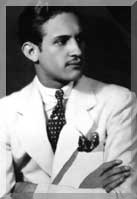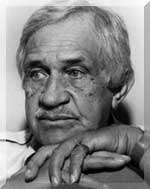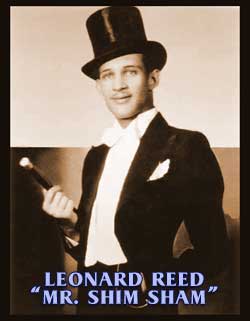
 LEONARD REED was best known as the co-originator with partner Willie Bryant of the Shim Sham Shimmy, a now-classic tap format that began as a flashy finale to their dance act in the late 1920s. In the book "Jazz Dance," Marshall and Jean Stearns define the Shim Sham Shimmy as "a one-chorus routine to a 32-bar tune with eight bars each of the Double Shuffle, the Crossover, the Tack Annie (an up-and-back shuffle) and Falling Off a Log." "Now it's been passed all around the world... it's become the national anthem of tap." LEONARD REED was best known as the co-originator with partner Willie Bryant of the Shim Sham Shimmy, a now-classic tap format that began as a flashy finale to their dance act in the late 1920s. In the book "Jazz Dance," Marshall and Jean Stearns define the Shim Sham Shimmy as "a one-chorus routine to a 32-bar tune with eight bars each of the Double Shuffle, the Crossover, the Tack Annie (an up-and-back shuffle) and Falling Off a Log." "Now it's been passed all around the world... it's become the national anthem of tap."
Born in Lightning Creek, Oklahoma, near Nowata, on January 7, 1907, a mix of black, white and Choctaw. He was raised by relatives and various guardians, growing up in Kansas City, where he won Charleston contests and worked summers dancing the Charleston at carnivals. He attended Cornell University but after winning another Charleston contest on a bet, he left school to start his dancing career. Picking up tap skills, he teamed with Bryant in a successful vaudeville act promising "Brains as Well as Feet," an act in which he and Bryant passed for white.
In 1934, Reed became a producer, working in Chicago, Los Angeles and New York with some of the era's best-known black performers. He staged shows at the famed Cotton Club and later managed the Apollo Theater, where he also served as master of ceremonies for 20 years. He also developed his talents as a songwriter, arranger, bandleader and comedian. "Dancing has been my only love," he said in a Fort Worth Star Telegram interview. "But I didn't let dancing stop me from doing other things. I have the ability to be multitalented."
The 1960s found him working for record companies, producing acts, choreographing dance numbers, and helping launch the career of singer Dinah Washington. He also wrote songs and taught dance in his Hollywood dance studio and in master classes coast to coast. He received a Lifetime Achievement Award from the American Music Awards in 2000, and two years later received an honorary Doctorate of Performing Arts degree from Oklahoma City University. At that time, he told the Sunday Oklahoman that his long, active life could be credited to "women, golf and show business... but not necessarily in that order."
 He also wrote a number of songs that were recorded by various artists such as Ella Fitzgerald, Louis Armstrong, Chick Webb, and Lionel Hampton. Several of these songs have been recorded by Moraís Modern Rhythmists, including his 1935 tune, "A Viperís Moan," as well as his 1932 hit, "Itís Over Because Weíre Through," with Leonard himself singing the vocals. His survivors include his wife of 52 years, Barbara Reed, a daughter, a granddaughter, and two great-grandchildren. He also wrote a number of songs that were recorded by various artists such as Ella Fitzgerald, Louis Armstrong, Chick Webb, and Lionel Hampton. Several of these songs have been recorded by Moraís Modern Rhythmists, including his 1935 tune, "A Viperís Moan," as well as his 1932 hit, "Itís Over Because Weíre Through," with Leonard himself singing the vocals. His survivors include his wife of 52 years, Barbara Reed, a daughter, a granddaughter, and two great-grandchildren.
|
Photo Gallery of Leonard Reed at Maxwell's at the Argyle
Video of Leonard Reed at the Orpheum Theatre in 1999
Watch on Youtube.com
Obituary from Associated Press

For Those I Love and Those Who Love Me
When I am gone, release me, let me go.
I have many things to see and do.
You must not tie yourself to me in tears.
Be happy that we had so many years together.
I gave you love, you can only guess
how much you gave to me in happiness.
I thank you for the love you each have shown to me.
But, now it's time I must travel on alone.
So grieve for me a short while, if grieve you must.
Then let your grief be comforted by trust.
It is only for a little while that we must part,
so bless the memories within your heart.
I won't be far away, for life goes on.
So, if you need me, call and I will come...
Though you can't see me or touch me,
I'll be near, and if you listen with your heart,
you'll hear all my love around you soft and clear.
And then, when you must come this way alone.
I'll greet you with a smile and say, "Welcome Home"
|



